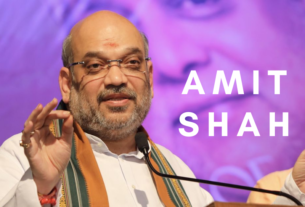Rajnath Singh is one of India’s most respected and longstanding leaders, known for his integrity, resilience, and deep commitment to the country. His journey from a small-town teacher to one of India’s most prominent political figures and its Defense Minister reflects a life dedicated to public service and national security. With his strong grounding in India’s political and cultural values, Singh has earned admiration and trust across party lines, making him a pivotal figure in India’s defense and political landscape.
Early Life and Education
Rajnath Singh was born on July 10, 1951, in a small village named Babhora in Chandauli district, Uttar Pradesh. His family, deeply rooted in agriculture, instilled in him the values of hard work, humility, and discipline. Singh’s early education was in local schools, where he developed a keen interest in mathematics and science. Driven by a passion for learning, he pursued higher studies in physics, earning a Master’s degree from Gorakhpur University.
While he initially chose a career in education, becoming a lecturer in physics, Singh felt a strong calling toward public service and social change. This desire led him to join the Rashtriya Swayamsevak Sangh (RSS) as a young man. The RSS instilled in him a sense of discipline, patriotism, and a belief in serving the nation, values that would define his political journey.
Entry into Politics: A Rising Leader in the BJP
Singh’s association with the RSS provided him with a pathway into the Bharatiya Janata Party (BJP), which was then in its formative years. In 1974, he formally joined the BJP, beginning his political career at the grassroots level. His early work involved organizing local communities and spreading awareness of the party’s ideology and vision. Singh’s dedication and ability to connect with people quickly earned him recognition within the BJP.
During the 1975-77 Emergency imposed by then-Prime Minister Indira Gandhi, Rajnath Singh was actively involved in resisting the government’s crackdown on political freedoms. As a result, he was arrested and spent several months in prison. This period of struggle solidified his commitment to democratic principles and his resolve to work for a government that represented the people’s interests.
In 1977, following the Emergency, Singh contested his first election and was elected to the Uttar Pradesh Legislative Assembly. His reputation as a principled and hardworking leader continued to grow, paving the way for future roles within the BJP at both the state and national levels.
Rising Through the Ranks: Roles in Uttar Pradesh and National Politics
In 1988, Rajnath Singh was appointed as the State President of the BJP’s youth wing, the Bharatiya Janata Yuva Morcha (BJYM), where he demonstrated his organizational skills and ability to mobilize young supporters. This experience enabled him to connect with a broader base of supporters and fostered his leadership skills. His work within the BJYM caught the attention of BJP leaders, and he was soon given larger responsibilities within the party.
In 2000, Singh became the Chief Minister of Uttar Pradesh, India’s most populous state, following the resignation of his predecessor. His tenure as Chief Minister was marked by his focus on law and order, rural development, and education. Singh introduced policies to improve agricultural productivity, expand educational opportunities, and promote infrastructural growth. His efforts in Uttar Pradesh reinforced his image as a leader committed to development and social welfare.
Following his tenure as Chief Minister, Singh continued to serve in significant roles within the BJP. In 2005, he was appointed as the National President of the BJP, a position that required him to steer the party through complex political landscapes and opposition. During his leadership, Singh worked tirelessly to rebuild the party’s organization, strategize campaigns, and bolster its ideological framework. His leadership during this period strengthened the BJP’s foundations, helping it regain political ground and prepare for national elections.
Key Roles in the Indian Government: Minister of Home Affairs
In 2014, with the BJP’s sweeping victory in the general elections and Narendra Modi’s ascension as Prime Minister, Rajnath Singh was appointed as the Union Minister of Home Affairs. This role was critical to India’s internal security, as the country faced challenges including regional tensions, terrorism, and social unrest.
As Home Minister, Singh implemented policies aimed at strengthening India’s internal security framework. He took a strong stance on combating terrorism, introducing measures to improve intelligence-sharing and counter-terrorism capabilities. Singh also prioritized modernizing the police force, enhancing infrastructure for border security, and addressing the needs of India’s paramilitary forces.
One of his notable achievements during this period was his work to stabilize Kashmir. Singh believed in balancing a tough stance on security with efforts to engage local communities. His tenure saw initiatives to improve communication between the central government and Kashmir’s local administration, demonstrating his commitment to a holistic approach in addressing sensitive issues.
Defense Minister: Protecting India’s Borders
In 2019, after the BJP’s re-election, Rajnath Singh was appointed as the Defense Minister of India. In this role, Singh has overseen significant developments in India’s defense policies, focusing on modernizing the country’s military and ensuring national security.
A defining aspect of his tenure as Defense Minister has been his emphasis on “Aatmanirbhar Bharat” (self-reliant India), particularly in the defense sector. Singh has worked to reduce India’s reliance on foreign defense imports by promoting domestic manufacturing. Under his leadership, the Ministry of Defense introduced several policies encouraging defense production within India, including partnerships with private and public sectors, to strengthen India’s defense manufacturing capabilities.
Singh’s tenure has also seen critical upgrades in India’s defense infrastructure and preparedness. He played a crucial role in strengthening India’s defense partnerships with other countries, signing defense pacts and enhancing military cooperation. His leadership has been particularly crucial in handling the India-China border tensions in the Ladakh region. Singh’s firm stance and timely decisions during the standoff demonstrated his dedication to safeguarding India’s sovereignty.
Leadership Style and Ideology
Rajnath Singh is known for his calm demeanor, patience, and consensus-building approach. His leadership style is defined by humility, integrity, and pragmatism. Unlike many leaders who favor aggressive rhetoric, Singh’s approach has always been one of respect for all parties, focusing on unity rather than division. His balanced approach has earned him respect across political lines and established him as a trustworthy leader.
Singh’s ideology is deeply rooted in Indian values, with a focus on nationalism and social welfare. He has consistently promoted the idea that India’s strength lies in its diversity, advocating for policies that uplift all sections of society while protecting India’s cultural heritage. His vision for India is one where economic development goes hand-in-hand with social harmony and cultural pride.
Legacy and Future
Throughout his career, Rajnath Singh has been a stabilizing force in Indian politics. His journey from a village school teacher to India’s Defense Minister is a testament to his unwavering commitment to the nation and his belief in public service. Singh’s legacy is one of resilience, integrity, and dedication to India’s welfare.
As Defense Minister, Singh continues to play a pivotal role in modernizing India’s military and strengthening its strategic capabilities. His work to promote self-reliance in defense production and his commitment to national security have laid a foundation for future generations. Rajnath Singh’s success story is an inspiration, reminding us that with hard work, humility, and a clear vision, one can make a lasting impact on a nation’s destiny.
Conclusion: A Life of Service and Dedication
Rajnath Singh’s journey is a story of quiet strength, principled leadership, and unwavering dedication to India. From his days as a teacher to his role as India’s Defense Minister, he has demonstrated a commitment to India’s security, growth, and unity. Singh’s legacy will be remembered as one of service, resilience, and patriotism. His success story is a powerful reminder of what can be achieved with dedication to the values of hard work, integrity, and love for one’s country.





